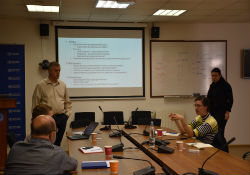Strengthening of health services delivery monitoring in the Region

WHO
Teams from the WHO European Office for the Prevention and Control of Noncommunicable Diseases (NCD Office), based in Moscow, Russian Federation, and the WHO European Centre for Primary Health Care (WECPHC), based in Almaty, Kazakhstan, met in Moscow in September to share experiences and brainstorm ways to enhance the monitoring of health services delivery in the WHO European Region. The collaboration between the 2 offices aims to strengthen availability of data for policy, planning and research on services delivery across the Region, while capitalizing on existing surveillance infrastructure and expertise.
A need to strengthen the monitoring of health services delivery
People-centred and integrated health services are essential for the achievement of universal health coverage and the Sustainable Development Goals. People-centred care focuses and is organized around the health needs of people and their communities. It recognizes that people play a crucial role in shaping health policy and the delivery of health services. Integrated care focuses on the management and delivery of good quality and safe health services, and ensures that people receive the continuum of affordable and accessible health care according to their needs throughout the life-course.
With the endorsement of the European Framework for Action on Integrated Health Services Delivery in 2016, Member States of the Region highlighted the need to strengthen the monitoring of health service delivery, as well as the need to develop a set of indicators to measure its effectiveness, quality and equity.
Close collaboration within WHO/Europe
Strengthening the monitoring of health services delivery is a group effort involving several divisions and programmes at WHO/Europe. The hub for noncommunicable disease (NCD) surveillance in the Region is based at the NCD Office in Moscow, which leads a number of activities, including the WHO NCD Country Capacity Survey and the WHO STEPwise approach to surveillance (STEPS) survey. The WECPHC, provides support to Member States of the Region in reforming systems to deliver people-centred, integrated health services based on a primary health care approach.
This brainstorming and planning meeting enabled the teams from the 2 offices to exchange experiences, review ongoing and future monitoring efforts and explore opportunities for collaboration in the areas of data collection, analysis and dissemination. The tools and existing platforms used and developed by the offices will jointly allow further strengthening of surveillance in the areas of integrated health-care services and NCDs in the Region. From this meeting, a plan for intensifying monitoring of health services delivery will be taken forward in a roadmap.
Establishing a baseline
The meeting of the 2 offices was part of the process of developing a roadmap for establishing a baseline study on health services delivery in the Region – a process that is also supported by the WHO Division of Information, Evidence, Research and Innovation.
This collaboration represents the extension of ongoing work in the improvement of health systems strengthening for better NCD outcomes. This work is jointly conducted by the NCD team within the Division of Noncommunicable Diseases and Promoting Health through the Life-course, the Division of Health Systems and Public Health and the WHO Barcelona Office for Health Systems Strengthening.



